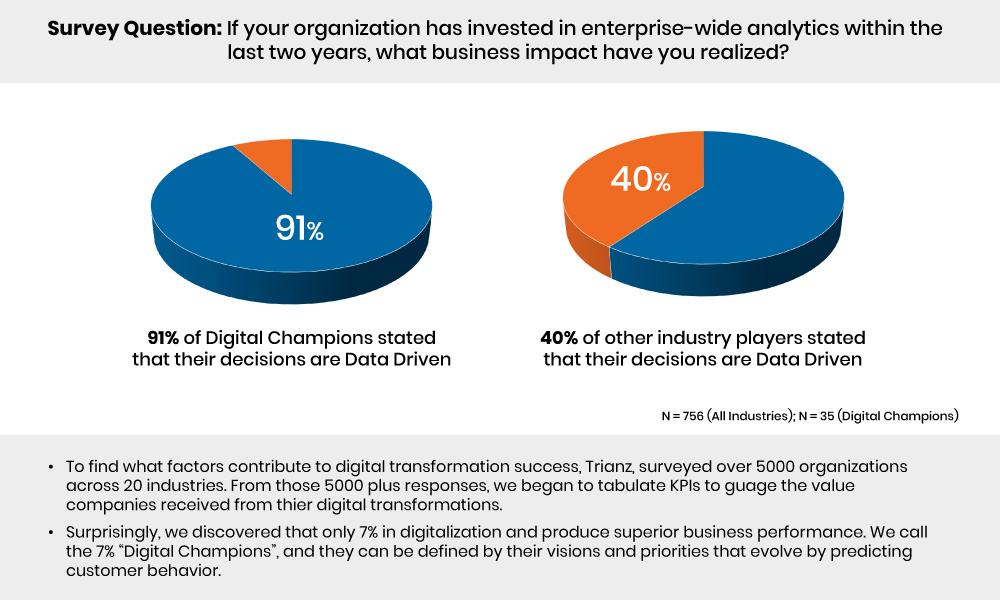Empowering teams with data: steps to foster a culture of analytics

A data-driven culture drives positive business outcomes. According to IDC, organizations with mature data cultures have two and a half times higher business outcomes, including increased revenues and profit. Research from Trasers (Trianz Research) supports this conclusion, finding that 91% of digital champions use analytics-driven decision-making compared to 40% of typical organizations.

A data-driven culture creates an environment where decision-making, by default, is based on data, statistics, and facts. Managers across the organization do not rely on their instincts for decision-making but on data. Fostering a data-driven culture is not always an easy task requiring buy-in from all levels of the organization.
Transforming your culture to be more data-driven takes time and does not happen overnight. Regardless of the challenges, a data culture will be a must-have for organizations wanting to compete in tomorrow's marketplace.
To create a data-driven culture in your organization, you need leadership, data literacy, data access, analytic tools, teamwork, and recognition.
-
Leadership Advocacy
A leadership-driven shift in mindset is the first step to creating a data-driven culture. Senior leaders need to instill the importance of data-driven decision-making throughout the organization. Leadership lower down in the company is also essential. Establishing data ambassadors to drive a data culture mindset deep into the organization is an effective tactic for propagating a data culture.
Transforming mindsets is a long and challenging process. Focusing on a few quick wins to highlight and validate your efforts can help maintain momentum. Creating a few popular and easy-to-use data products is one way to quickly demonstrate a data-driven culture's effectiveness.
-
Role-Based Training and Support
To build a data-driven culture throughout your organization, you must ensure all your employees have the right skills to work with data to support decisions. Robust training programs should focus on teaching managers and workers how to read, interpret, and understand the data produced by your data strategy. This includes workshops, courses, and training on basic data concepts, understanding data visualizations, and using analytic tools. Skills in using data effectively to make decisions are also crucial to driving data culture. Data Storytelling is one such skill. Using data to tell a story and make a point are important capabilities to empower employees to drive change through data. Training your entire organization to communicate and take a stand with sound data analysis skills is paramount to fully embracing a data-driven culture.
Role-based training is another important driver of data culture. Ensuring employees possess the right specialized skills to support their colleagues should also be a focus of your strategy. Training employees to become data stewards to ensure data is safe and accessible and data product managers and producers who work to create useful and reusable data products will support better data access. Domain managers also need specialized training to streamline data access for employees outside their groups.
-
Access & Tools
Leadership and training can take your data initiatives only so far. Organizations must make data readily available and provide the tools to support data-driven decision-making. This approach requires self-serve data. Traditionally, ETL pipelines and complex data engineering processes have stood in the way of everyday decision-makers to access data easily and quickly. Self-serve strategies that enable non-technical employees to discover and access the best data are vital to fuel data-driven decision-making. No code and AI-enabled tools are making it easier than ever for everyone in your organization to access valuable data.
While front-end visualization tools are available, working out the process for sharing data across different silos can limit this capability. In many organizations, sharing data across various departments and data silos has political and technical barriers. The inability of employees in your organization to explore data outside their domain limits their ability to better understand broader trends and opportunities. One of the mitigating issues is ensuring that data is protected and only those authorized have access to sensitive and private data. Data products and granular access rules can support a more nuanced data accessibility strategy. Instead of limiting access to entire data sets because one row contains PII data, modern data governance technologies can mask sensitive data while enabling access to the rest of the data set.
Avrio was created to enable self-serve easy access to data with granular and sophisticated governance to facilitate data sharing across data silos. These capabilities encourage data exploration, driving curiosity and the growth of data culture.

-
Promote Collaboration
As your data culture grows and individuals are led, trained, and empowered with data access, the last step is building a collaborative community. Involving your whole organization in perpetuating your data culture will only strengthen it. Empowering individuals to work together and instilling a sense of responsibility to steward enterprise data and support coworkers drives better data health. When everyone in your organization is committed to helping each other with the best possible data, a sense of responsibility, stewardship, and teamwork emerges.
When employees take data quality seriously, more reliable data and insights are inevitable. Data cleansing strategies that unite teams and empower workers is a great place to start building teamwork and accountability.
For teams to work together efficiently, communication needs to flow freely. While easy access and self-serve are the goal, complex governance, data access, and transformation requirements can still pose a challenge. By creating formal communication channels, these obstacles are quickly overcome. For example, gaining access to a certain data set may require authority from a domain manager. A mechanism to facilitate this request and enable frictionless access can support greater teamwork and faster access to data. Similarly, mechanisms enabling data consumers and engineers to work together more efficiently facilitate greater teamwork and produce more valuable data products.
-
Empower Domain Experts
Collaborative federated governance strategies enable domains and IT to work together to make as much data available as possible while maintaining security and privacy. Domains and IT work with data users to manage access and governance to ensure access is not over-restricted while ensuring sensitive data remains secure. Empowering domain managers also enables those experts who understand the business that creates the data in a better position to support greater collaboration.

The Avrio platform provides a data catalog, data product marketplace, and access controls that support collaboration and teamwork. Data users can request data products from producers and engineers. By posting business requirements for data products in the marketplace, producers can tailor each product to users’ needs. Data users can also request access to data products from domain managers and IT. These requests are fulfilled right through the platform. This balance between collaboration, access, and control enables greater flexibility and empowerment to sustain a growing data culture.
A central platform to exchange ideas and the technology to turn ideas into reality helps drive innovation. Standardizing terminology with a business glossary and metadata in a central platform also streamlines communication to ensure that professionals in different functions and parts of the organization speak the same language.
-
Reward Data-driven Initiatives
Humans while resist to change respond well to positive reinforcement. Building programs that reward and recognize individuals who initiate and move your data programs forward will be motivated to continue as well as inspire others to follow their lead.
Outcome
We all have our own biases and preconceived notions that influence decision-making. These biases are not always accurate, but leveraging data can support or debunk our assumptions, leading to better decision-making. Building a data culture is iterative, as greater insight drives greater curiosity. Investing in data culture provides compounding returns as skilled use of data leads to new insights and innovations.
Request a Demo TODAY!
Take the leap from data to AI
